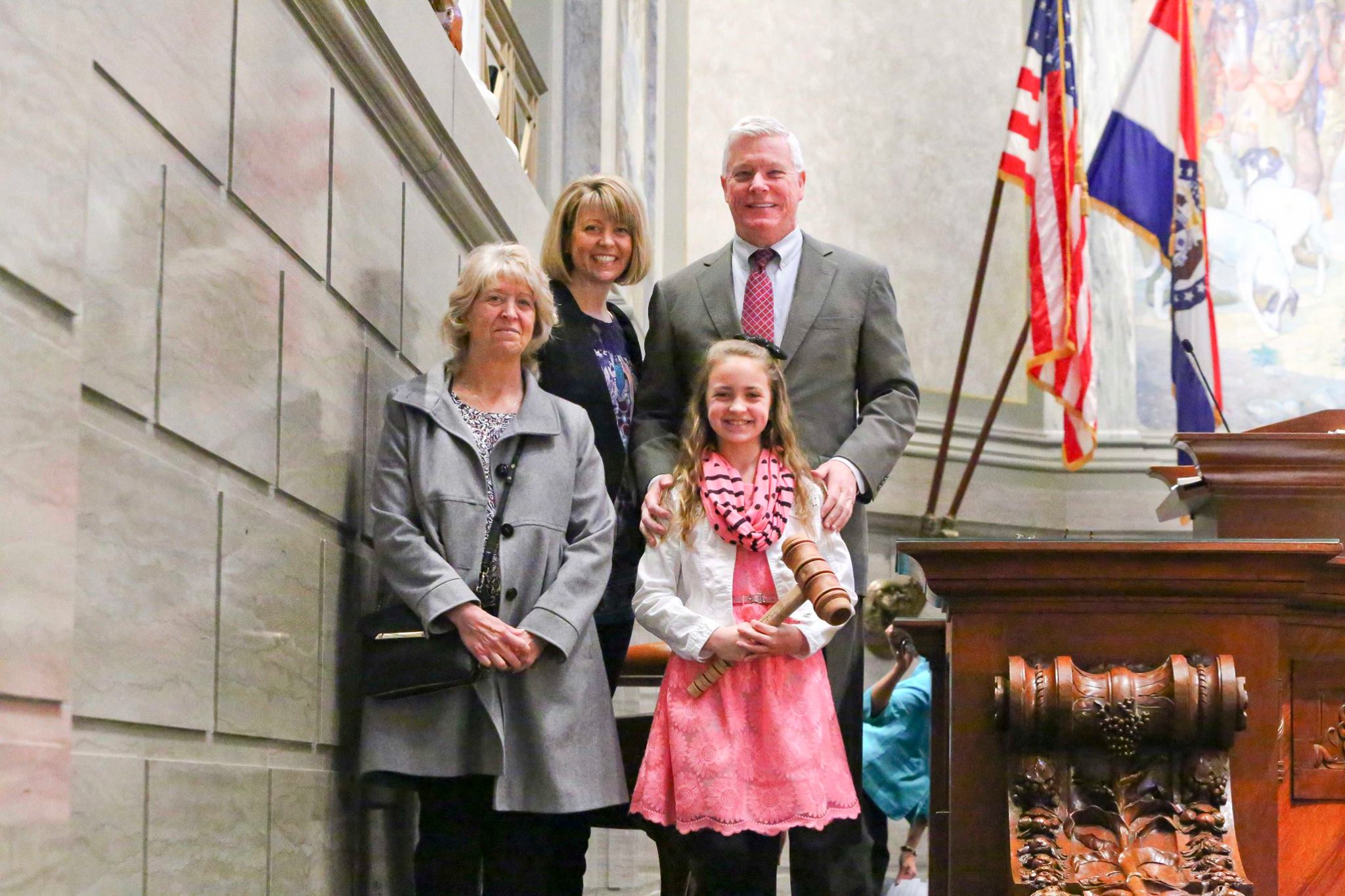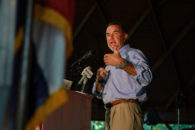JEFFERSON CITY, Mo. – Lt. Gov. Peter Kinder announced his candidacy for governor near what some are calling the “Ground Zero” of failure of Gov. Jay Nixon. Nixon is termed out, but term limits are not stopping Kinder from lumping Democratic gubernatorial candidate and attorney general Chris Koster in with his fellow Democrat.

This month, Kinder called on Koster and Nixon to debate him on Right-to-Work, a bill vetoed by the Governor, in a move seen by many as merely an attempt at gaining attention.
“Right now, and for the last month or more, I’ve been trying to get a debate going on Right-to-Work and I issued a challenge [to Koster and Nixon],” Kinder told The Missouri Times. “They basically ignored the request and I knew they would.”
But, Kinder isn’t dropping the debate, which history could have predicted. He got Missouri State University to agree to host the debate and he is hoping to find a different Democrat or Union executive to publicly debate the issue in Springfield and hopefully beyond in his hometown of Cape Girardeau and again in St. Louis and Kansas City. The vetoed bill is sure to come up during veto session, but far less than the needed supermajority necessary for override voted for the bill during session. If Kinder were successful in organizing the debate, it would be a bold move to vie for the hearts and minds of constituents with “no” representation in the state house.
“Put both sides of an issue out there and let the people decide,” Kinder said. “People should have a right to hear that.”
Kinder’s politically-balanced nurturing goes back over 30 years, when he was the associate publisher for the Southeast Missourian – a newspaper based out of Cape Girardeau. Under still-publisher Gary Rust, Kinder regularly wrote a column that appeared side by side with the other side of the aisle’s piece.
“He knew I was conservative and he encouraged me,” said longtime colleague Jay Eastlick, reflecting on his first writing gig out of college at the Southeast Missourian with Kinder. “He’s always had a soft spot in his heart for young conservatives. He was always pointing out articles to read. I think he actually bought me my first subscription to National Review. I’ve always considered him a mentor.”
“I worried when he got into politics that we were going to lose a conservative voice at the paper,” Eastlick laughed. “He always wrote these bare knuckle columns just lobbing bombs at liberals.”
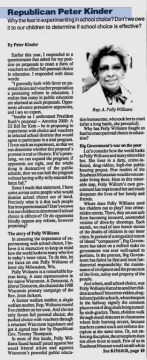
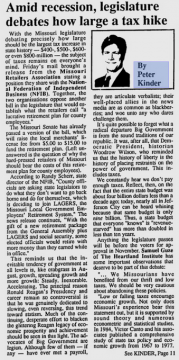
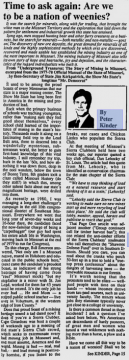
“The manner of expression has changed, I’ve certainly softened,” said Kinder on his columns of yesteryear. “I have strong convictions, and I can be combative. I was a brash, young, 30-something year-old who was given a pen and ink.”
Pen and ink have documented a consistently combative relationship with Nixon going back 20 years. As a columnist, Kinder, who is also an attorney, called Nixon out during his first years as attorney general for leading investigations Kinder said the office had “no jurisdiction whatever” being involved in. While Kinder was a senator, he took then-Attorney General Nixon all the way to the supreme court over an issue with Nixon’s office hiring outside counsel for a multi-state tobacco deal. Kinder held nothing back when it came to Nixon’s handling of the civil unrest in Ferguson, calling the governor “weak” and “confused” on multiple occasions and further criticizing his use of the National Guard, which were not stationed in Ferguson when the verdict of Darren Wilson was released, leaving broad criticism that the powers-that-be left Ferguson to the whims of looters and arsonists for the night.
Kinder established an early precedent for refusing to ignore solidly-Democratic areas such as the urban cores of St. Louis and Kansas City, and fully plans to campaign on a legislative issue of regular controversy: education.
“I will be a champion of school choice for the mostly minority kids who are trapped in failing inner-city schools,” Kinder said.
Kinder reflected on a conversation with an urban school administrator who told him, “We’re preparing kids for one of three fates – lifetime of poverty, the penitentiary, or an early trip to the cemetery.”
People asked Kinder why he went to Ferguson yesterday and chose to announce there, which is surprising considering his consistent campaign outreach to urban areas, to which he said, “My message to everyone in this state is we’re all in this together. We tried anger and strife and division. I think the people want this behind us. I think they want people who will go in and say, ‘You matter.'”
Kinder never neglected the urban areas while campaigning, having fundraisers and blasting advertisements on hip hop and rap stations during re-elections. Kinder said his strategy, which has definitively increased favorable votes, is “the leadership of the Good Shepherd.” Kinder said he will continue to “leave the 99 of the flock to rescue the one.”
And while Kinder faced some in 2008 and 2004 that claimed he was on a “fool’s errand” to focus so heavily on the urban core, he brought in almost 20,000 more votes than McCain in St. Louis City and 56,000 more votes in St. Louis County due to his efforts.
“I know I’m not going to get a majority or a third or the African-American vote… I’m going to show people I do care about them,” Kinder said. “Ward by ward, in the Obama hurricane, McCain was getting 2% and I was getting between 6-11% [of the vote in St. Louis City.] … I was 56,000 votes ahead of McCain [in St. Louis County.] Did I get a majority? No. Third? No. Quarter? No. But, I was the only survivor [of statewide Republican officials] while carrying 102 of 114 counties.”
The support of urban Democrats has been key for Kinder, who in 2008, ran an ad voiced by Kansas City Rep. Betty Thompson, who spoke about working with Kinder on housing, healthcare and education. During his announcement on Sunday, Rep. Courtney Curtis was joined by Ferguson Mayor James Knowles, continuing Kinder’s push for a theme of diverse support.
“I’ve tried to show my good will and show that I listen and I will be responsive to needs whenever and wherever,” Kinder said.
Kinder reiterated from his speech yesterday that this will be a Republican campaign “like no other.”
This won’t be Kinder’s first shot at a historic campaign. In 1972, when Kinder was 18, he was a gopher and driver for then-Attorney General Jack Danforth, who was running for re-election. Danforth and Kit Bond continue to serve as mentors and inspirations to Kinder.
Kinder went on to college at Southeast Missouri State University and then law school, attending St. Mary’s University in Texas. He graduated a semester early in December of 1979 and came back to Missouri to study for the bar exam, which was only months away.
“I came back to Missouri and was studying for the bar and was paralyzed with fear that I was going to fail,” Kinder said, sharing that he actually took a cram class for the test at St. Louis University with Phyllis Schlafly, another inspiration. “I was taking the bar exam in the first week of March and there was statewide Lincoln Days in downtown St. Louis at is now the ballpark Hilton. I told myself, if I study 8 hours today, I’m not going to study Saturday night and I can go to Lincoln Days. I go down there and they say, ‘You’re from Southeast Missouri, you need to meet this guy.’ Republicans had not won that congressional seat since 1928 and I thought that he would be that year’s sacrificial lamb.”
The current congressman in Southeast Missouri was Bill Burlison, a Democrat elected in 1969. Kinder went on to meet Bill Emerson and his wife at that Lincoln Days, but didn’t think any more of it.
“I took the bar, I drove home and had dinner at my parent’s house. The phone rang and it was Bill Emerson,” Kinder said. “He offered me the job as campaign manager. I told him I couldn’t, that I had a real job. ‘I’m going to go work as an assistant prosecuting attorney for Prosecuting Attorney Stephen Limbaugh.’
“He said, ‘I already talked to Steve, I talked to some other people and you’ll still have that job after the campaign.’ He had taken the 9 days [after Lincoln Days] to check me out.”
Al Sikes, an Assistant Missouri Attorney General from Cape Girardeau who went on to become the Federal Communications Commission chairman, was the campaign’s consultant, who Kinder also cites as a mentor and inspiration.
“We worked hard and we worked our tails off,” Kinder said. “We defeated a 6-term incumbent. We were 10,000 votes ahead of Reagan. Some say we rode on his coattails, but I think it was mutually beneficial.”
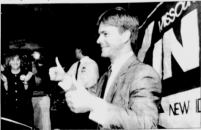
Courtesy of the Southeast Missourian
But then Kinder stepped out of politics for a bit to be an attorney for Drury Inns, only to make another career change to work for Gary Rust, publisher of the Southeast Missourian. Kinder worked for Rust for 17 years as the associate publisher. Kinder ran for the senate in 1992 and ascended to leadership, but not before taking those first shots at Nixon with his column.
Republicans attained the majority while Kinder was in senate leadership, the margin was thin, forcing Kinder to foster negotiations, not only across the aisle, but with the House, which some say had more power than the upper chamber at the time.
“It was very difficult for senior Democrat leaders who had been in the majority,” said Bill Kenney, a current Public Service Commissioner who previously served as the Senate Floor Leader with Kinder and was a former chief of staff for the Lt. Governor’s office. “We decided that we were not going to treat them the way they treated us. I think, that year, Republicans passed 55 and Democrats passed 45 bills. [Kinder] had the power of the pro tem. I’d caucus with the Democrats, and we’d go over things. We still had the numbers and then they grew. We showed two parties who worked together.”
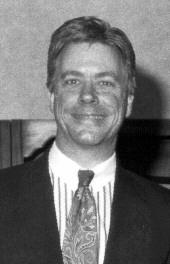
In 2003, during Gov. Bob Holden’s second to last year in office, Kinder had more bills signed by the governor than his other years in the Senate combined, which then-Capitol staff say was a sign of meaningful negotiation between parties that is lost today with supermajorities.
Despite negotiation, Kenney said many of Kinder’s bills were conservative and Kinder “kept fighting for them.”
Kinder had bills relating to guns, abortion, and tax credits. He also had bills outlining workplace nondiscrimination and religious freedom, protecting dram shops, banning cross burning, ensuring the “spiritual needs” of veterans in state facilities, and requiring community notification of sex offenders. He repeated his sponsorship of legislation to benefit the Missouri School for the Deaf and requiring higher education instructors to be fluent in English.
The announcement for lt. governor in 2004 had a similar feel to this week’s announcement. Kinder had $11,000 in the bank and carried a high profile tenure as pro tem. Newspapers and colleagues constantly asked the leader if he would run, and in July 2003, he announced that he would announce his plans the following month.
He officially left the Southeast Missourian after he took shots on the campaign trail from his general election opponent Bekki Cook about the time demands of the office when he referred to the past law practices of former lt. governors. He vowed to make his service as lt. governor a full time job, though it technically is a part time position, entering office the same time as Gov. Matt Blunt.
Upon moving into his office on the second floor, Kinder quickly became one of the most highly visible lt. governors Missouri has had in recent years by growing the role of senior advocate, becoming active on various boards and commissions, and vocal on ongoing political issues. At his prime, Kinder has served as the senior Republican in the room, the man with the most time in the chamber.
“Bob Priddy is known as the historian of the Capitol,” Kenney said. “I’ll tell you how good a job Peter Kinder does: when Susan Montee ran against Kinder, she said she was going to get a staff member to be a veterans advocate. Bob Priddy wrote that that was one of the few jobs that the lt. governor does have. Kinder does the senior service awards, but he also does the veterans service awards. That’s not one of his titles. Priddy wrote that that was one of his titles, [Kinder] worked it so hard.”
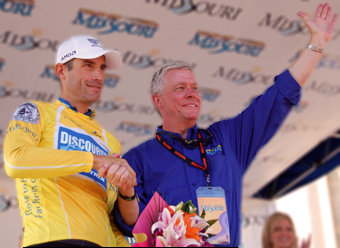
In 2006, a Blunt supporter brought the idea to the office of a professional-style bicycle race in Missouri, which Kinder quickly saw value to. As a member of the Tourism Commission, Kinder put the idea into action and the first Tour of Missouri was in 2007. According to an economic study from the University of Missouri, the race brought the state over $20 million. Organizers even billed it as the third highest profile race in the United States.
There were three editions of the race, but the third was almost a miracle. The race was funded both privately and publicly. Under Blunt, public dollars through the tourism’s budget were secure. The 2009 race, the first under Nixon’s administration, saw provisional budget cuts to tourism budget, which were restored when teams threatened a breach of contract lawsuit which would have costed the state more than the budgeted funds.
A past staffer applauded the race, despite its end due to budget cuts from the current governor’s office, as an impressive event.
“These were the same teams that are racing in the Tour de France this summer,” said the staffer. “[Kinder] was highly visible, whether it was on the Tourism Commission or another role. He traveled constantly and did a lot to raise the profile of the office. … He travels 24/7 to all parts of the state and he’s not afraid of St. Louis or Nodaway County – he has visibility and connections across the state and he does what he needs to do while keeping up with the key issues important to Missouri. The think you’ll see is he’s just constantly been involved in Missouri issues and he’s not afraid to speak up for folks.”
There have only been 10 Republican lt. governors in the history of Missouri, but Kinder is the longest serving from the party in an office lacking term limits. The Governor’s Mansion has only seen 13 Republican governors and there are almost as many candidates vying for the position today.
Kinder has more state-elected experience than his opponents combined, but far less money.
“I’ve got a lot of work to do,” Kinder told The Missouri Times. “I expect there will be no million dollar checks written.”
Kinder said he gave the idea of running 90 days before making it official.
“It wasn’t until recently that I decided to make this run,” Kinder said. “I was watching in dismay as candidates lined up and went against each other.”
The longtime lt. governor said he is “trying to pick up the banner of Tom Schweich” and push comprehensive ethics reform. Kinder actively campaigned in support of Schweich during his re-election and was seen at several election events during Schweich’s initial run.
“Tom had called for an end to politics of personal destruction and taking buckets of slime and dumping them,” Kinder said. “What they want is an open, honest discussion and to key up the differences. Let’s face the facts and let fair arguments carry the day.”
Kinder’s constant campaigning and high visibility may be one of the reasons his name identification is so high, a major advantage with a candidate who reported less than $60K on hand in the spring. The number doesn’t bother Kinder, who had only $11,000 in his campaign account when he made his first and successful run for lt. governor in 2004. Former senate colleagues shared that they had no doubt that he would be able to raise the money he would need to successfully campaign, and additionally that Kinder wouldn’t need anywhere near as much as his opponents due to his impressive name identification in all parts of the state.
“Peter has never lost a race,” Kenney said. “It’ll be difficult, but he’ll work at it.”
Kinder previously flirted with a bid for the Governor’s Mansion in 2012, to be set back by an article in the Riverfront Times containing an interview and picture of a former stripper with Kinder. In 2008, Kinder stated he had “crossed the rubicon,” implying to many he intended to run against his nemesis, Jay Nixon, but ended up bowing out to let then-Congressman Kenny Hulshof take the bid.
“It’s his time to run,” said a former Capitol staffer from his time as Senate pro tem. “It’s do or die for Kinder, and the people will decide.”
Featured photo courtesy of Molly Teichman.
Rachael Herndon was the editor at The Missouri Times and also produced This Week in Missouri Politics, published Missouri Times Magazine, and co-hosted the #MoLeg podcast. She joined The Missouri Times in 2014, returning to political reporting after working as a campaign and legislative staffer.
Rachael studied at the University of Missouri – Columbia. She lives in Jefferson City with her husband, Brandon, and their two children.

